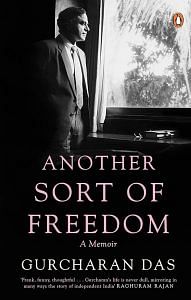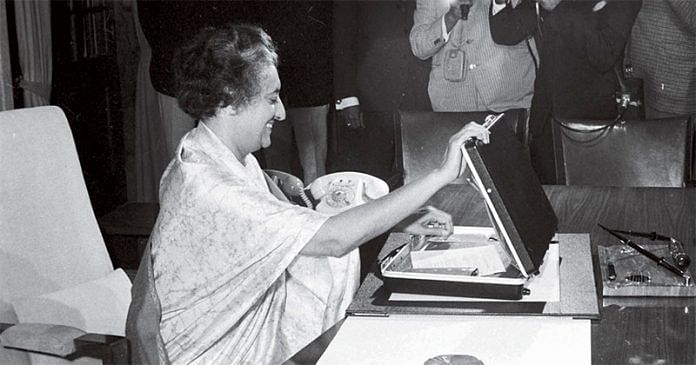Jawaharlal Nehru, her idealistic father, had wanted a caring, egalitarian society, but the bureaucracy had given him a command economy, a ‘Licence Raj’, which took away our economic freedom. It is difficult to blame Nehru—he had been a product of a socialist age. One must squarely blame Indira Gandhi, however, for not changing course when Japan, Korea and Taiwan had already shown the way. They had opened up, adopted export-oriented policies, while India persisted with a closed economy, wallowing in export pessimism. These nations would become ‘Asian Tigers’, while Indira’s closed, command economy would suppress growth, keeping India poor. When individuals blunder, their families go down. When rulers fail, it is a national tragedy.
I was now a middle manager. One of life’s truths is that almost everything seems to be a failure when you’re in the middle. As companies grow big, they insert layers of middle managers between those at the top who run the business, and those at the bottom who do all the work. Middle managers get so caught up between managing up and down that they become bureaucrats, entangling everyone in paperwork, losing touch both with customers as well as their own products. As a result, bright and hungry youngsters are forced to deal with layers of bureaucracy before they can implement fresh, innovative ideas of their own.
Our company’s model middle manager was the head of personnel, who was always dressed in a sharp suit, a white shirt and an elegant tie. He noticed one day that one of my product managers had shown up in tennis shoes. It was bad enough that I (and my team) had shed the necktie a few weeks ago. When the personnel head had complained, I had told him to lighten up—after all, ours was a hot, tropical country, and one had to be comfortable. He had conceded reluctantly on the tie issue, but tennis shoes . . . this was taking things too far.
The offending young man, I discovered, had blisters on his feet; leather shoes aggravated them. I was satisfied with the explanation, but the personnel manager was not. He began to keep a close watch on my department’s attire. When the same offender showed up a few days later without socks, he hit the roof. His blood pressure rose, and he stormed into my office, declaring, ‘There ought to be a law!’ To calm him down, I gave him some background. The man without socks had executed a brilliant promotion the previous year, which had had a significant impact on the company’s profits. As a result, everyone had received a bonus.
Also read: Markets, memoir, moksha — Gurcharan Das traces India Story from Licence Raj to liberal…
The offending young man didn’t have to come to work with sores on his feet, I argued, but he had put the company’s work ahead of his comfort. The personnel middle manager went away fuming, shaking his head. The blisters went away soon, and so did the tennis shoes. Despite my apparent success, I felt imprisoned by my impressive title, my company flat and the company car. I was spending hours coordinating activities, shuffling papers and writing long reports that no one read. One morning, I was giving an important presentation to some big shots from the headquarters. I’d done my homework, got all the facts and figures; my shoes were shiny, my delivery perfect. Only one thing was wrong: no one was listening. They were all preoccupied with a recent change of guard at the headquarters. They were worrying about their careers, about where they would fit in.
The futile labours of the middle manager came to a head the following year. There was a flu epidemic in India. As a result, sales of the entire line of Vicks cough and cold products shot through the roof. The factory worked overtime to meet the demand. At the end of the season, the company declared record profits. Everyone was happy, except the legal department. The company secretary, with fear in his eyes, came to my room, accompanied by two lawyers with long faces. Our sales had exceeded the production capacity authorized in our official licence. We had broken the law, and it might mean a jail sentence. They wanted my help to draft a defence. From heroes we had become criminals, and a pall of gloom descended on the office.
Sure enough, we received a summons from Delhi. It was a preliminary hearing, but I had to be present. Two lawyers accompanied me to the joint secretary’s office, where we were made to wait for hours. The officer was reading a newspaper as we entered. He gave a cold look that said he didn’t want to be disturbed. I was afraid but tried not to show it. Eventually, he looked up.
‘What?’ he asked impatiently.
One of the lawyers handed him a copy of the summons. He glanced at it irritably. ‘What?’ he repeated. I explained nervously that the flu epidemic had resulted in extra demand for our products. We had merely done our duty in keeping the shelves stocked at pharmacies. Our products had come to the rescue of millions of mothers whose children had suffered from the flu.
He stopped me, irritation showing in his voice. ‘But you have broken the law!’ he thundered. I replied politely that something was wrong with the law that punished one for producing things that had benefitted millions of sick people. Anywhere else, one would be applauded for treating the sick, especially children. The joint secretary pushed his chair back noisily, signalling the end of the interview. We had broken the law, and the law would now take its course.
As I reached the door, I don’t know what came over me. I turned around defiantly and asked him how our country would appear to the world if news got out that our government had punished the executive of a foreign company for helping to produce products that alleviated peoples’ misery during an epidemic. Imagine such a story on page three of the New York Times.
‘Are you threatening me?’ he thundered.
‘No, sir. I was merely appealing to your common sense as a fellow citizen. By punishing us, you’d be making our prime minister a laughing stock of the world outside.’ He gave me a venomous look and gestured me to get out of his office.
The lawyers were trembling as we stepped out, convinced that our goose was cooked. I was calm, although I wanted to get as far away as possible from the stink of the Licence Raj. The joint secretary was ready to kill anything that breathed of spontaneity or human achievement, the opposite of my ideal of moksha. I’d rather battle a demon in hell than have a face-off with such a bureaucrat. It was my first experience of Indira Gandhi’s bizarre regime, which gave you a licence to produce a specific quantity of a product, in a specific location, with specific technology and on a specific machine. Instead of looking after your customers’ needs, you could spend a lifetime idling outside Delhi’s government offices.
In the end, the lawyers’ verdict on our meeting turned out to be wrong. The government never wrote back, dropping our case quietly. But not before giving me many sleepless nights.
 This excerpt from Gurcharan Das’ Another Sort of Freedom has been published with permission from Penguin India.
This excerpt from Gurcharan Das’ Another Sort of Freedom has been published with permission from Penguin India.



